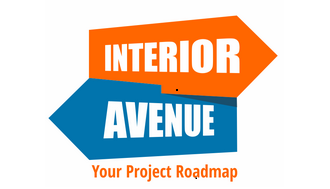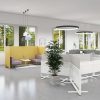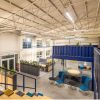Inspiring Office Designs for Tomorrow’s Workplace
First impressions matter! When candidates walk into an office, they immediately observe the appearance of your building and start developing their impressions of your company. Prospective employees will be more excited about joining your company if you have an attractive workspace. To attract the top talent, the financial package and company culture remain key drivers in the job market but must be articulated in the physical space as well.
Millennials and Gen Z employees form a large part of the workforce today, and these employees look beyond just the salary when they make their decision about whether or not to accept a job offer. Candidates are becoming increasingly savvy to the design elements and their benefits, or drawbacks, with the physical workspace and the wellness of the work environment. New research points out that office design doesn’t just affect recruitment, it can even cause candidates to reject an offer if the space is particularly uninspiring.
Tempe, AZ
Project Roadmap

The research and the groundwork
According to one study, 81% of job hunters say that the office design and workplace environment are important factors that help them decide whether they would work in that company. Of the candidates that have been offered jobs at companies with uninspiring office designs, 43 percent rejected the offer because of the office environment. This is a tricky situation as employers are looking for every possible edge to help them attract and keep the best people. Every time you make offers to talented individuals, only 60 percent of them will accept. This is not a fruitful scenario. A study found that additional physical amenities is the top influencer in their decision. These are the amenities that benefit primarily employees, such as in-house gyms, car parking, or childcare services.
To figure out which physical amenities your employees and candidates most prefer, direct communication is the best bet. You can ask them directly, or you can create and distribute a short survey about workspace preferences. Once you’ve enough data, review the results and identify common preferences. This will help you determine which new amenities will help you attract and retain the employees you want most.
It turns out that a well-designed workspace is an important tool to attract and keep the employees your business needs.
Office Furniture
Tempe, AZ

Workplace design elements and strategies to look for
To help your organization recruit and retain top talent, we’re looking at office design elements and workplace strategies that can help you master that first impression, and create a positive working environment to maintain the satisfaction of the employees.
Use of natural and spatial assets
If you have the facility of having a prime location with natural beauty or stunning views, take advantage of it to create an attractive environment. Use glass walls on this side of the office, and glass-walled partitions in the interiors as well, so as to create minimum visual interruptions through space. Transparent glass also lets in natural sunlight deep within the office, rather than just at the peripheral areas. The layout within the office can be designed to ensure that a maximum number of people can enjoy the stunning view at once. As well as creating a positive first impression, natural light also provides long-term health benefits for employees, which can help with employee retention.
Balancing private and open spaces
It’s important to create a variety of different workspaces, catering to different working styles and needs of the workers. For example, if your office is an open-plan area to encourage collaboration and communication, it’s also important to add closed, private workspaces such as pods or booths for individual working, as well as closed meeting rooms, so teams can run extended meetings without disturbing the rest of their colleagues.
Office Furniture
Project Roadmap

Designing for everyone
Individuals from each of the four generations that comprise today’s workforce – baby boomers, Gen X, millennials, and the Gen Z. Workspace needs and expectations change across generations and the office should be able to suffice them all. Senior-level executives may work best in a semi-private space that allows for immersive focus and minimal distractions, while others may feel more inclined to work in an open workspace. Younger workers, especially, want unconventional and flexible spaces, rather than being stuck in cubicles for the whole day.
Brand and Culture
Great spaces speak for themselves. Nothing communicates your company culture more clearly than your office space. Branded spaces indicate success, which improves employee recruitment and retention efforts (not to mention client perceptions). When you present a well-designed workplace to the world, it sends a message. It communicates in a sort of visual identity and reveals your company’s processes, priorities, and personality. Having the right space can become a powerful attractor for quality candidates.
Resimercial design elements
The new idea is making the office inviting and familial and making it more like home. Resimercial design includes everything from couches and lounge chairs to indoor plants and Oriental rugs — anything to help your employees feel cozy and comfortable. In addition to making workers feel more at home, one of the major benefits of these resimercial spaces is the increased opportunity to socialize with one another.
Tempe, AZ
Project Roadmap

Employees as brand ambassadors
Companies redesign to improve overall productivity, efficiency, and employee engagement. Employees who feel connected to their workplaces are more engaged and happy. Happy employees sharing pictures and videos of your office and culture spark interest and attract attention. Genuine happy employees will indirectly promote your brand and will be interested to refer to more talented people. It’s all part of the chain reactions that you trigger once you design a smart workplace.
The Takeaway
Companies are adapting to the changing nature of work by refocusing on a workplace that offers balance, variety, and a sense of purpose. Placing existing and prospective employees at the center of the workplace design lifecycle improves productivity, creativity, and wellness. If you’ve already invested in great workplace design, make sure you’re maximizing the benefits of this powerful recruitment tool. If you planning for a redesign, then create a space that the employees want to be in. When your office is a nice place to be, your employees feel happy about returning to work the next day.






Leave a reply